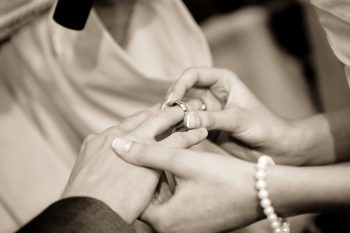Two interesting Arabic proverbs about marriage Posted by Hanan Ben Nafa on Dec 13, 2017 in Arabic Language, Culture, Vocabulary
Proverb is one of the fun ways you can learn about more a language and the culture of its users. Today, we’re going to look at two interesting proverbs أمثال (شعبيه) – حِكَم from the Arabic heritage. Both of them are linked to marriage but in two very interesting ways!
Proverbs have an important role in the society as people consider them an invaluable piece of advice نصيحه and the result of the collective experience of wise older generation الجيل القديم . What is particularly interesting about the two proverbs we’re learning about today is that the piece of advice نصيحة that each gives contradicts the other تتضارب مع الأخرى !
The two proverbs are:
- امشي في جنازة ولا تمشي في جوازة imši fi ganaaza walla timši fi gawaaza
(Being involved in a funeral is better than trying to arrange marriages)
- يا بخت من وفق راسين بالحلال ya baxt min waffa’ raasen bil-halaal
(Lucky that who helped two get together permissibly)
*Raseen: two heads (literatl meaning).
These two proverbs are formulated in colloquial Egyptian Arabic, however, they are by no means specific to the Egyptian cultural heritage and are actually used across the Arab world. There are usually equivalents to a proverb in other Arabic dialects, but I have never heard these two specific proverbs expressed in another dialect other than Egyptian Arabic.
Now, let’s look at the first of these proverbs:
- The first proverb is regarded as a reminder or a warning against the act of matchmaking and setting two people up due to the implications this act can have. This is a reference to arranged marriages, which are very common in the Arab world. Many people try to avoid getting involved in them so that they’re not held accountable for any conflicts arise between the couple in the future.
This proverb is used when someone wants to justify their reluctance to get involved in setting two people up or introducing them to each other.
- Interestingly, the second proverbs is an invitation to do completely the opposite. It’s actually a call for people to help two individuals get together permissibly بالحلال in a halal way, and marriage is what is implied here, off course.
Unlike the first proverb, one may use this to remind someone who doesn’t approve of arranged marriages that setting two people up is a good thing and something that one can be rewarded for by Allah. Having said that, this act is purely cultural and has no clear basis in Islam.

Build vocabulary, practice pronunciation, and more with Transparent Language Online. Available anytime, anywhere, on any device.





Comments:
John Breckbuhl:
Great stuff, and so timely for me, as I am into Arabic proverbs at this very moment.
https://youtu.be/YvrBHJdjKOY
Kevin Poston:
Interesting content. Will be back to see more. Thanks!
My blog https://writingofkevinposton.blogspot.com/